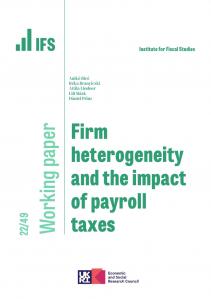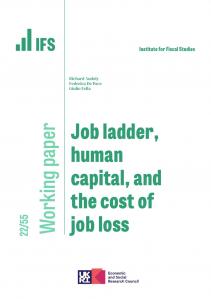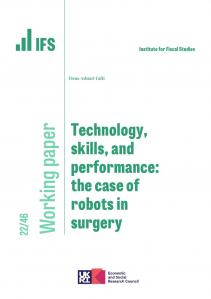Downloads

wp0434.pdf
PDF | 437.11 KB
This paper investigates the determinants of vertical integration using data from the UK manufacturing sector. We find that the relationship between a downstream (producer) industry and an upstream (supplier) industry us more likely to be vertically integrated when the producing industry is more technology intensive and the supplying industry is less technology intensive. Moreover, both of these effects are stronger when the supplying industry accounts for a large fraction of the producer\\\'s costs. These results are generally robust and hold with alternative measures of technology intensity, with alternative estimation straegies, and with or without contraolling for a number of firm and industry-level characteristics. They are consistent with the incomplete contract theories of the firm that emphasize both the potential costs and benefits of vertical integration in terms of investment incentives.
Authors

CPP Co-Director, IFS Research Director
Rachel is Research Director and Professor at the University of Manchester. She was made a Dame for services to economic policy and education in 2021.

Fabrizio is Chair of Macroeconomics, Institute for International Economic Studies and an International Fellow of IFS.

Research Fellow London School of Economics
Philippe is an IFS Research Fellow, a Professor of Economics at LSE, at the College de France and at INSEAD, and a Fellow at the Econometric Society.

Daron Acemoglu
Working Paper details
- DOI
- 10.1920/wp.ifs.2004.0434
- Publisher
- IFS
Suggested citation
Acemoglu, D et al. (2004). Vertical integration and technology: theory and evidence. London: IFS. Available at: https://ifs.org.uk/publications/vertical-integration-and-technology-theory-and-evidence (accessed: 30 June 2024).
Related documents
More from IFS
Understand this issue

Spring Budget 2024: What you need to know
7 March 2024

If you can’t see it, you can’t be it: role models influence female junior doctors’ choice of medical specialty
24 April 2024

The NHS waiting list: when will it come down?
29 February 2024
Policy analysis

How do the last five years measure up on levelling up?
19 June 2024

The Conservatives and the Economy, 2010–24
3 June 2024

A decade and a half of historically poor growth has taken its toll
3 June 2024
Academic research

Firm heterogeneity and the impact of payroll taxes
24 November 2022

Job ladder, human capital, and the cost of job loss
13 December 2022

Technology, skills, and performance: the case of robots in surgery
7 November 2022